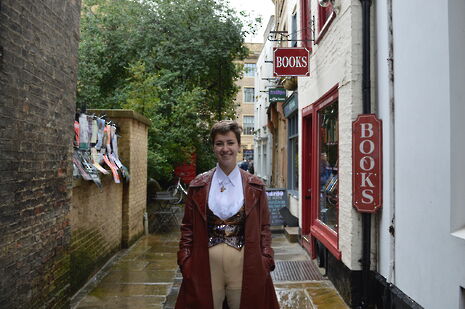It’s okay to be amateur
From Camdram credits to creative cocktails, Helena Fox reminds us that in the intensity of Cambridge theatre, being amateur is allowed.

I walk into the ADC Bar.
Immediately, I am hit by a wall of sound and heat as I wave to familiar faces across the room. I pick my way through sweaty bodies and loud voices to reach the bar and decide which £4 cocktail to try this time, or, indeed, whether I’m in it for the long haul and should get two stamps on my loyalty card with the double-cocktail deal. Be it an evening spent deep in conversation with friends – having snagged the sofa, the bar’s prime real estate – or jumping between groups of acquaintances until the inevitable arrival of the inebriated John’s Gents at the Maypole’s closing time, the ADC bar, like the rest of the Cambridge 'thesp' scene, carries a certain weight. Even the cocktails’ cleverly show-themed names serve as a pressing reminder that this is The Theatre.
The first two shows I did at Cambridge were collegiate – I performed first at Robinson’s Brickhouse Theatre and then Magdalene’s Cripps Auditorium, both of which involved giggling backstage (and sometimes onstage) and friends providing a solid chunk of the (not always that large) audience. I then ‘graduated’, as is the proper thing, to Corpus and ADC shows at the end of my first year, and I sensed a certain changing of the guard. There seems to exists a silent hierarchy that college theatre is somehow ‘lesser’, and, despite it providing some of the best experiences of my time in theatre at university, and many of my closest friendships, I now feel it would be odd for me to ‘go back’ to it. Having said this, there does appear to be some movement in this area. The success of last year’s Revlon Girl, originally staged at Robinson, and the exciting set of shows programmed at the college this Michaelmas would indicate a rising awareness of the potential of the Brickhouse Theatre.
However, I felt, newly involved in the ADC, that whatever we were producing had to have a certain clout to it – it had to pass the test of the Varsity reviewers, fulfil the ticket sale expectations of the funding body, and must avoid being – God forbid – amateurish. Of course, shows in Cambridge are ticketed (at a price), so audiences arrive with certain expectations, while productions have the potential to yield enormous and important social capital; this term’s The Convert and last year’s The Children’s Hour spring to mind as shows that deserve every inch of spotlight the Cambridge name can bring them. Moreover, it is obviously no bad thing to have high aspirations or aim for quality execution, but it sometimes feels, as I navigate the complex personality politics and relentless hamster-wheel of Cambridge theatre, that it would be good to remind ourselves that we are amateurs.
Part of my discomfort with Cambridge theatre is its all-or-nothing nature. You’re either in, or you’re not. It can, if unchecked, become all-consuming; it is common to poke fun at the rowers who rise early for an outing, yet it is the accepted (and even expected) norm to skip lectures and classes for rehearsals or get-ins and to stay up throughout the night, sometimes until times like 6am, to complete get-outs, before stepping onto the treadmill of another show and another week of a Cambridge degree. We must recognise that it is incredibly alarming that the bar is licensed until 8am for show after-parties. This is not healthy.
Cambridge theatre bears a hefty history. Many people – internally and externally – view it as a career launchpad. Countless reviews from both professional and student papers reference the starry alumni of the ADC, while I’ve heard people discuss who from ours peers is going to ‘make it’. You cannot even visit the bathroom without seeing Sam Mendes’ quote that he would not have gone into directing was it not for the ADC. It mounts a certain pressure or expectation that we should strive, and should want to strive, to be the next Olivia Colman or Mel Giedroyc, and that anything less than this is not enough.
The stark intensity of Cambridge theatre was highlighted for me recently when a new postgrad student remarked that, at their previous university, they had staged a production of Chicago which was in rehearsal for four months. At Cambridge, the same show is being put on in around five weeks, and the standards will be undoubtedly high and the results impressive. This, to me, emphasises how Cambridge seems compelled to do what everyone else does, but a million times more.
I do not for a second dispute the undeniable talent in Cambridge, nor the staggering wealth of opportunities available to us, which are both peerless and priceless for those looking to gain experience in theatre, and for which I am incredibly grateful. But I feel driven to remind all of my fellow ‘thesps’ that sometimes, you are allowed to be an amateur. You are enough.
 News / SU reluctantly registers controversial women’s soc18 December 2025
News / SU reluctantly registers controversial women’s soc18 December 2025 Features / Should I stay or should I go? Cambridge students and alumni reflect on how their memories stay with them15 December 2025
Features / Should I stay or should I go? Cambridge students and alumni reflect on how their memories stay with them15 December 2025 News / Dons warn PM about Vet School closure16 December 2025
News / Dons warn PM about Vet School closure16 December 2025 News / Cambridge study finds students learn better with notes than AI13 December 2025
News / Cambridge study finds students learn better with notes than AI13 December 2025 News / CUP announces funding scheme for under-represented academics19 December 2025
News / CUP announces funding scheme for under-represented academics19 December 2025








